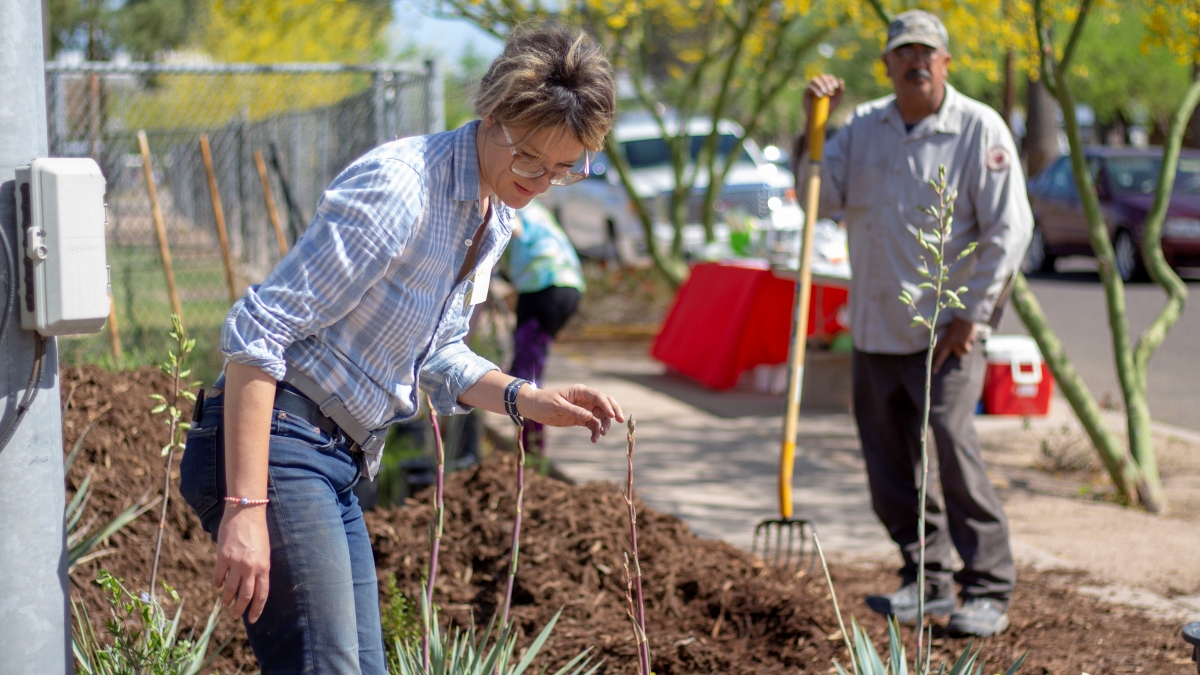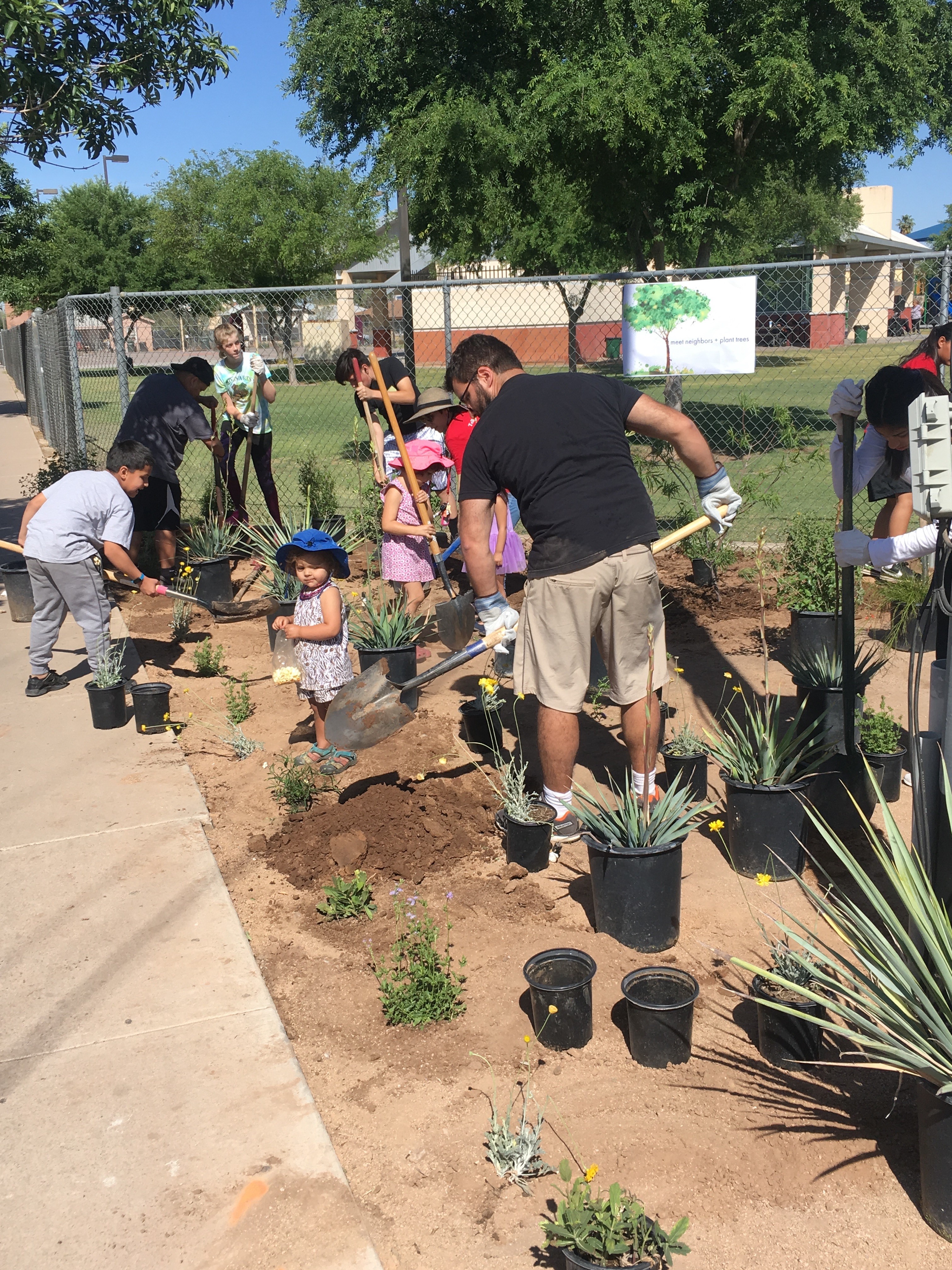Editor’s note: This is part of a series of profiles for spring 2018 commencement.
For Kristin Antkoviak, plants and trees are one way to achieve social justice.
Antkoviak, who is graduating with a master’s degree in landscape architecture, has used her expertise to help revitalize her Phoenix neighborhood. And in connecting her neighbors with a little bit of nature, she’s carving out a new kind of career.
“I think it’s important that landscape architects transition from working for typical firms to working directly with neighborhoods because in terms of sustainability, social equity is highly under-addressed,” said Antkoviak, who has been named one of two outstanding graduate students for the spring semester by the Herberger Institute for Design and the Arts.
During her time at ASU, Antkoviak saw the importance of giving design help to vulnerable populations. She participated in a yearlong service-learning studio partnership with Hawai’i Green Growth, in which several ASU teams collaborated on a strategy to mitigate flooding in an area near a canal.
“We worked at a grassroots level with local communities and all the way up to the federal government,” she said. “And through that I started to understand that the policy end is critical to a lot of these issues we’re facing.”
After her experience helping poor neighborhoods in Hawai’i, Antkoviak decided to move into a “tiny house” dwelling in the neighborhood near Central Park in Phoenix, south of Chase Field.
“There were no street trees. The first thing I started to do was pull historical maps from 1930 until now and you can see there were almost no trees from then until now,” she said.
She noticed that the air quality was poor and that there was no sense of community among the residents. So last year, she and a neighbor started organizing community meetings, and she set up a day for everyone to volunteer to help plant trees.
“It’s a ‘small-is-beautiful’ approach to building community capacity,” she said.
They planted a hardy hybrid mesquite variety that can withstand low watering and doesn’t get too big.
“We didn’t know how many volunteers we would get but it turned out fantastic,” she said.
So they organized another planting in April, this time setting up a community pollinator garden, with native shrubs and perennials meant to draw butterflies.
“We asked people what they wanted and the main thing they wanted was color,” she said.
“I went door to door and I didn’t say, ‘This is the tree you’re going to get.’ I asked, ‘What do you like?’ Then I helped them with landscape architecture knowledge to fine tune what would be good. They didn’t even know some of the types that existed.”
They ended up planting 10 kinds of native trees in addition to the garden, which included desert marigold and flame acanthus.
That experience inspired her to think of a new kind of career.
“I’m starting to think about this concept of a neighborhood landscape architect who works directly with people,” she said.
“I’m big on empowering residents to understand that they can make a big impact. I’m trying to make a new role that doesn’t exist yet.”
Kristin Antkoviak organized a tree- and garden-planting day in her Phoenix neighborhood.
A neighborhood landscape architect would help educate people on water use and the tradeoffs of different kinds of trees they like, as well as coordinate with government and advocacy agencies.
“After 100 years of these social environmental injustices, I think these native plants can give a healing aspect to the community. Nature has so much to offer.”
Question: What was your “aha” moment, when you realized you wanted to study the field you majored in?
Answer: I was working as a microbiologist at Mayo Clinic for six years. I’m from a small town in northern Michigan, and I liked microbiology but I wanted to connect with nature and the land again.
Q: What’s the best piece of advice you’d give to somebody who wants to do this?
A: I would talk directly to the professors in the program and also to past students so they can see how they turned out. It’s professors, students and professionals. You have to hit them all.
There are a couple groups in the community that would be good to talk to too: The Arizona Alliance for Livable Communities, the Arizona Partnership for Healthy Communities, the Downtown Voices Coalition. The Sonoran Institute is a great connection and also the Sustainable Cities Network.
Q: If someone gave you $40 million to solve one problem on our planet, what would you tackle?
A: I would spend it right here. I would try to grow out the neighborhood green infrastructure. Landscape architecture can help us contribute to a sustainable planet. Plants provide that medium to connect to people. It all ties into community health.
Top photo: Kristin Antkoviak, who is earning a master's degree in landscape architecture, helped to organize to tree planting and garden installation in her Phoenix neighborhood.
More Environment and sustainability

A world full of plastic ... not fantastic
Editor’s note: This is the seventh story in a series exploring how ASU is changing the way the world solves problems.When Timothy Long’s kids were growing up, he never let them toss…

Team wins $10M XPRIZE Rainforest competition for novel solution
Several Arizona State University experts are on a team that created a new way to put a price on the rainforest in order to save it, and on Friday they won the top award in the prestigious $10 million…

ASU President Michael Crow named to TIME100 Climate list
Arizona State University President Michael Crow has been named to the 2024 TIME100 Climate list of leaders and innovators driving real climate action.The list includes leaders across a range of…

